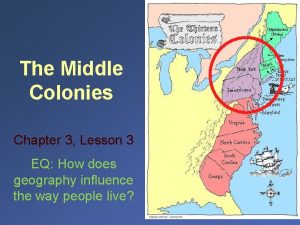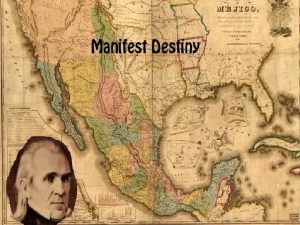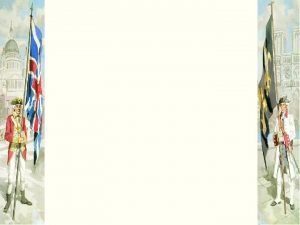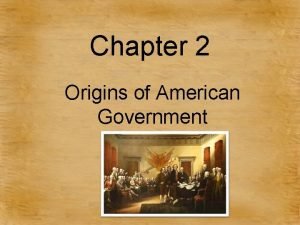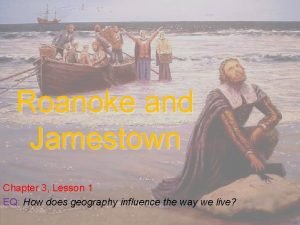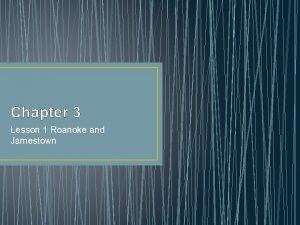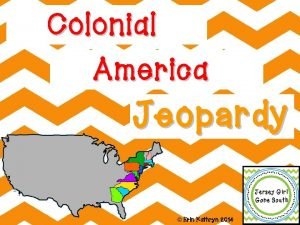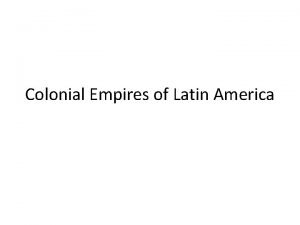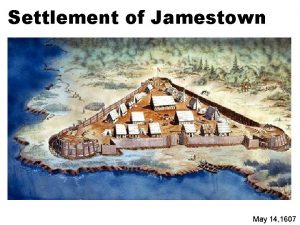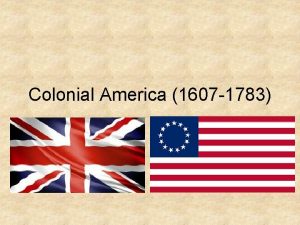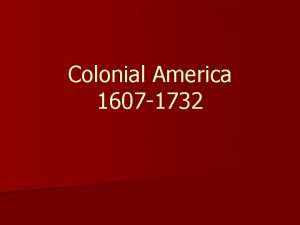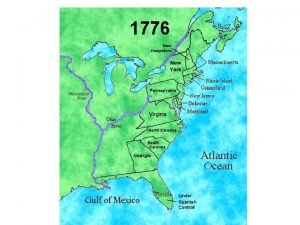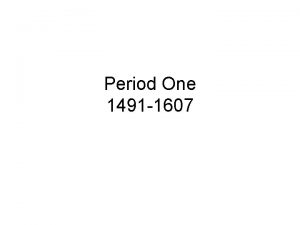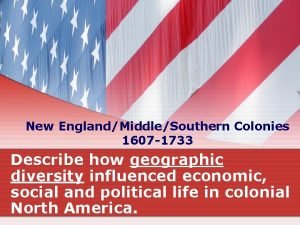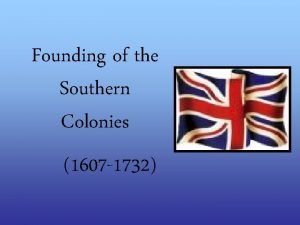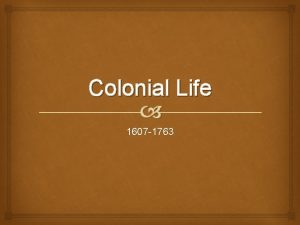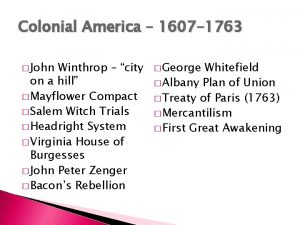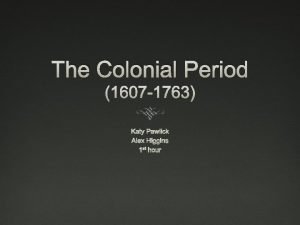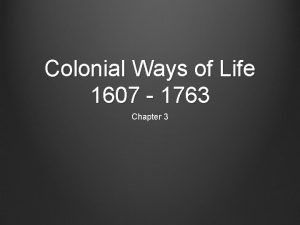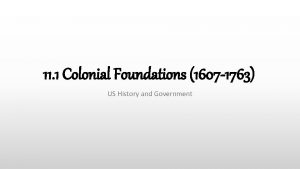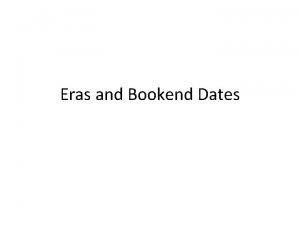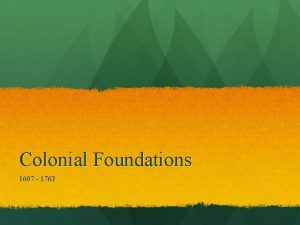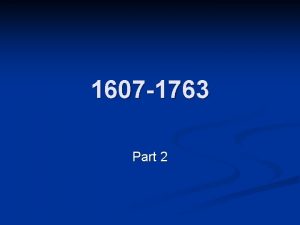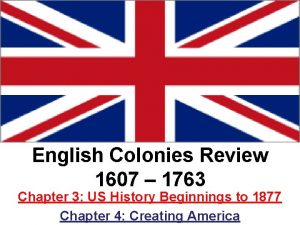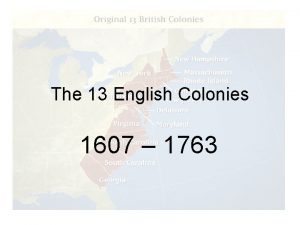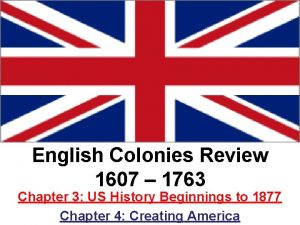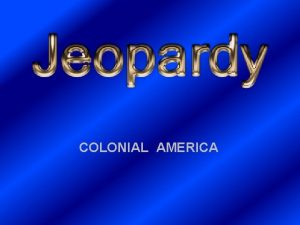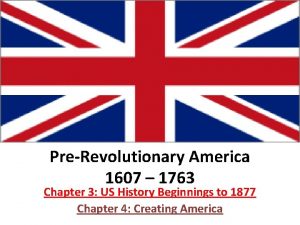Colonial America 1607 1763 Different Types of Colonies


















- Slides: 18

Colonial America, 1607 -1763


Different Types of Colonies A. Charter Colonies (Connecticut, Rhode Island) 1. Established by settlers who had been given a charter by the King. B. Proprietary Colonies Pennsylvania) (Delaware, Maryland, 2. Person or Group given land by Britain, free to rule as they wished. C. Royal Colonies (Georgia, Massachusetts, New Hampshire, New Jersey, New York, North Carolina, South Carolina, Virginia). 3. Britain directly ruled all royal colonies. The King appointed the governor.

British Colonial Policy Copy of British Form of Government A. The Governor. 1. appointed by the King or the proprietor 2. Financially dependent not on the King, but on the colonists. B. The Colonial Assemblies. radford, William B ssachusetts r of Ma dren. jpg nd Governo ell. com/decoster/chil w 2 ck ro : //www. lew http – Served as advisors to governor. – Legislators pursued their own interests.

British Colonial Policy Copy of British Form of Government A. Colonists think of themselves as Englishmen. 1. King and Governor treated each situation as it arose. 2. Parliamentary legislation applied to entire British Empire. • Parliament believed that it represented all people. • No elected representatives from colonies. A. Virtual vs. actual representation 3. No true centralized government in colonies. • Colonies worked independent of the others.

British Colonial Policy Forms of Participation A. Most common form of government 1. Colonial Assembly • Virginia House of Burgesses 2. Townhall Meeting • New England – Democracy in its purest form. – Church members met to elect their officials and attend civic issues

The Origins of Early Government in the Colonies Magna Carta The Mayflower Compact The Virginia House of Burgesses Fundamental Orders of Connecticut English Bill of Rights, 1689

I. The Signing of the Magna Carta, 1215

I. The Magna Carta, 1215 A. King John, constantly demanded money and men for wars B. In 1215 forced King John forced to agree that he had “no right” to demand property without ppl’s consent. C. King must now get consent of the people 1. King is bound by a higher law that limits his authority .

II. Virginia House of Burgesses, 1619

Virginia House of Burgesses A. 1619 the first representative government appears in Virginia. 1. imposed taxes, made laws, ran the colony 2. modeled after the English Parliament.

III. Signing of the Mayflower Compact

Mayflower Compact, 1620 A. 1620, Pilgrims write a contract that allows for self-government. B. The Mayflower Compact promised that every adult male would vote for the Governor and his advisors on a yearly basis. 1. It supports the idea of representative gov’t.

IV. Fundamental Orders of Connecticut, 1639

Fundamental Orders of Connecticut, 1639 A. First written constitution in North America. B. It was an outline for self-government of the colony. 1. Adult males elected a governor, assistants, and a legislative assembly to make laws for the community.

English Bill of Rights, 1689 A. William & Mary agree to give Parliament and people more power than the monarchs after the Glorious Revolution: 1. 2. 3. 4. Parliament agrees on laws not the king Parliament raise taxes Parliament okays the raising of an army Parliament and public have free speech against the government 5. Trial by jury 6. Elections and debates

Main Themes of Colonies Neglect • Colonies were largely neglected and left alone by Britain due to other concerns at home. • Allowed colonies to develop at their own pace Legislatures • The various colonial legislatures considered themselves a parliament for the colonies. • Self-government is a tough thing to give up once it is experienced. • - Moving out of parents house and then moving back in

Colonial Government (Recap) 1. Colonial governments like the House of Burgesses elect their own representatives 2. Representatives made laws, imposed taxes, fines and managed colonial affairs 3. Colonists believe they are Englishmen and should have a say in their government
 Lesson 3 the middle colonies answer key
Lesson 3 the middle colonies answer key Expansion of the united states of america 1607 to 1853 map
Expansion of the united states of america 1607 to 1853 map North america 1750
North america 1750 Southern colonies entertainment
Southern colonies entertainment Chapter 2 lesson 1 government in colonial america
Chapter 2 lesson 1 government in colonial america Colonial america lesson 1 roanoke and jamestown answer key
Colonial america lesson 1 roanoke and jamestown answer key Colonial america lesson 1 roanoke and jamestown
Colonial america lesson 1 roanoke and jamestown Early american games
Early american games Colonial america jeopardy
Colonial america jeopardy Colonial america jeopardy
Colonial america jeopardy Colonial empires in latin america
Colonial empires in latin america 1607:4
1607:4 May 14 1607
May 14 1607 1783-1607
1783-1607 1732-1607
1732-1607 1776-1607
1776-1607 1491 to 1607 timeline
1491 to 1607 timeline 1733-1607
1733-1607 1607-1732
1607-1732
